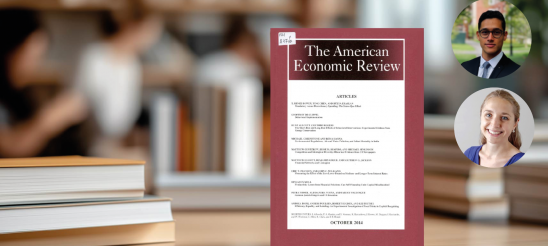Every year, CREST welcomes a new cohort of researchers who bring fresh perspectives, curiosity, and energy to our community. This fall, we are pleased to host new researchers, postdoctoral fellow, PhD students, and visiting researchers from around the world.
Their arrival marks an important moment in the life of our lab: the opportunity to grow, to renew dialogues across disciplines, and to continue building a vibrant and diverse research environment. Whether they join us for a few months or several years, these newcomers contribute to the intellectual richness and collaborative spirit that define CREST.
We are pleased to introduce the researchers who are joining CREST this year, each bringing their unique background and expertise to our four research areas: economics, sociology, statistics, and finance-insurance.
Researchers
This year, several new researchers are joining CREST, strengthening our core faculty and bringing new perspectives across ou disciplines.
Philippe Coulangeon is a CNRS Research Director, affiliated with the Centre for Research on Social Inequalities (CRIS) at SciencesPo Paris.
His work is set at the intersection of cultural sociology and social inequalities. He explores the stratification of cultural practices and tastes, the dynamics of mass versus elite culture, artistic professions, and the democratization of culture. More recently, he has integrated environmental concerns into his analysis.
Fanny Landaud is a CNRS researcher from CY Cergy Paris University and she is an IZA Research Fellow since 2019.
Her research covers applied microeconomics – particularly labor, education, family, and health economics – with a focus on the determinants and consequences of socioeconomic and gender inequalities in education and the labor market.
Antonio Ocello was a Postdoctoral Researcher in Statistics and Machine Learning at École polytechnique (CMAP) since 2023.
His research focuses on mean-field games and mean-field control problems, branching diffusion processes, and stochastic optimal control, combining advanced probabilistic methods with applications in machine learning. He has contributed to work on convergence bounds for trust-region policy optimization in mean-field games and is developing stochastic target frameworks for branching processes.
Enrico Ruolino was a Senior Researcher at the University of Lausanne.
His work focuses on public and labor economics, with a particular emphasis on behavioral responses to tax policy, gender inequality, intergenerational mobility, and educational outcomes.
Clémentine Van Effenterre was previously an Assistant Professor of Economics at the University of Toronto.
Her research lies at the intersection of labor economics, applied microeconomics, and political economy. Notably, she investigates how norms, institutions, and policies shape labor market outcomes – examining issues like maternal labor supply, gender gaps in science and tech, and how having daughters influences political attitudes. She also hosts the “InequaliTalks” podcast on economics and inequality.
Postdoctoral Fellows
Our new postdoctoral researchers are contributing to ongoing projects and launching their own work in close collaboration with CREST teams.
Stéphane Lhaut, in the Finance-Insurance team, with Caroline Hillairet and Olivier Lopez.
Angelica Martinez-Leyva, in the Economics cluster at CREST-ENSAI, with Marion Goussé
Andrea Pandolfi, in Statistics, with Nicolas Chopin
Arthur Stephanovitch, in Statistics, with Austin Stromme
Lishu Zhang, in the Finance-Insurance team, with Olivier-David Zerbib
PhD Students
This year, we welcome a new cohort of PhD students who are beginning their research journeys within our vibrant academic community.
30 new PhD students are joining our laboratory in our different research clusters.
9 PhD students will join our Economic team, 7 in the Finance-Insurance cluster, 12 new PhD students in Statistics, and 2 in our Sociology team.
4 of them will join our lab on the CREST-ENSAI campus in Bruz while the remaining PhD students will join our CREST-ENSAE Paris campus in Palaiseau.
This new team will also be joined by 3 PhD students in ATER contracts in the CREST-ENSAI campus.
Visiting Researchers
CREST is also hosting several visiting researchers this year, joining us for research stays that foster international collaboration.
Yang Chen (Lausanne University, Switzerland) is joining our Economic team to work with Julien Combe on Microeconomic theory and matching theory.
Matias Ortiz (Universidad de Chile, Chile) will work with Vianney Perchet on Learning-Augmented Online Algorithms for Matroid-Constrained problems under Partial in our Statistical team.
Simon Luck (Universita di Bologna, Italy) is joining Etienne Ollion’s team in Sociology to work on using natural language processing to study the relevance of the news media for political representation and decision-making processes.
Jules Verin (ENS Lyon, France) will work with Bertrand Garbinti in Economics on Wealth Accumulation, Life Cycle, and Taxation.
Väinö Yrjänäinen (Uppsala University, Sweden) is joining the Sociology team with Etienne Ollion to work on using work embeddings and transformer models in computational social sciences.
L’IA générative est-elle un gain pour la recherche ?
Summer School on Environmental Data Collection and Analysis for the Social Sciences
From June 2 to 6, 2025, the Energy4Climate (E4C) Interdisciplinary Center and CREST brought together 20 participants for a Summer School on Environmental Data Collection and Analysis for the Social Sciences.
Over the course of one week, participants took part in lectures, workshops, and group activities designed to strengthen their skills and foster collaboration. A special highlight of this edition was the opportunity to join shared sessions with Columbia University, made possible through the Alliance partnership. These exchanges created a unique space for dialogue between institutions and disciplines, all centered on the challenges of climate and energy transitions.
This Summer School was made possible thanks to the generous support of the Fondation de l’École polytechnique and the Fonds Ifker pour le Climat. Their commitment played a key role in making the program accessible and impactful for the next generation of researchers.
We extend our warm thanks to all speakers and participants who contributed to the success of this edition.
Relive the Summer School experience and hear directly from participants in the video below
Anna Korba receives an ERC Starting Grant for her project OptInfinite
We are pleased to announce that Anna Korba, Assistant Professor in Statistics at CREST-GENES, Professor at ENSAE Paris and Hi! Paris affiliated member, has been awarded a prestigious ERC Starting Grant for her research project OptInfinite – Efficient infinite-dimensional optimization over measures.
Launched in 2025 for a 5-year duration, the project aims to develop new optimization and sampling methods over probability measures — a central challenge in artificial intelligence and modern machine learning.
Optimization over probability measures has become an increasingly powerful approach to tackling complex problems involving uncertainty. Unlike traditional methods that work with fixed data points, this framework deals with entire distributions, even in very large or infinite-dimensional spaces.
This is especially useful for sampling tasks, which consist in generating representative examples from a distribution or model. Such tasks are crucial in:
- Bayesian machine learning, where sampling helps quantify uncertainty in model predictions;
- Generative modeling, where it is key to generating realistic new data, such as vectorial data (e.g. images).
However, existing methods often fall short: they are computationally expensive, difficult to evaluate, and poorly suited to high-dimensional or complex distributions. Moreover, they are designed to generate vectorial data, but not more complicated structures such as infinite-dimensional data.
With OptInfinite, Anna Korba aims to overcome these challenges by building a unified theoretical and practical framework, drawing on tools from optimal transport and information geometry. The project will:
- develop more efficient and adaptable sampling algorithms;
- design robust evaluation tools to assess the quality of generated samples;
- deliver an open-source software toolkit to make these methods widely accessible.
The approach will be tested on real-world applications, including large-scale AI models, Bayesian inference, biological systems modeling, and more.
These are fundamental problems in statistics and machine learning, that can be useful in various areas where quantifying uncertainty or when accessible data is scarce, such as finance and economics.
🎧 Curious to learn more about Anna Korba’s background and vision? Check out her interview in our CRESTive Minds series:
👉 Episode 3 – Anna Korba
Quand l’histoire économique éclaire les accord commerciaux
Le 25 août 2024, Béatrice Cherrier, historienne de l’économie, chargée de recherche au CNRS, chercheuse au CREST et professeure associée à l’École polytechnique, est intervenue dans l’émission Entendez-vous l’éco ? sur France Culture.
L’épisode intitulé “Accords commerciaux : que reste-t-il à négocier ?“, revenait sur l’accord commercial conclu cet été entre Donald Trump et Ursula von der Leyen, et interrogeait plus largement les enjeux des négociations transatlantiques. Aux côtés de François Chimits (Institut Montaigne) et de Sylvie Matelly (Institut Jacques Delors), Béatrice Cherrier a apporté un éclairage original en explorant la fabrique de l’expertise économique.
L’apport de l’histoire de l’économie au débat public
Dans son intervention, Béatrice Cherrier a montré comment l’histoire des sciences économiques permet de mieux comprendre la manière dont les modèles et outils mobilisés par les économistes influencent les politiques publiques. Elle a notamment souligné l’importance de prendre en compte les contraintes méthodologiques et techniques qui orientent les choix des experts – par exemple la recherche de modèles “tractables”, c’est-à-dire plus faciles à manier et à résoudre, mais parfois au prix d’une simplification excessive des réalités étudiées.
En mettant en perspective l’évolution de la pratique économique au cours des dernières décennies, Béatrice Cherrier a rappelé que les instruments utilisés aujourd’hui pour analyser les accords commerciaux ne sont pas neutres : ils sont le produit d’une histoire intellectuelle, institutionnelle et technologique qui mérite d’être interrogée.
Un regard CREST sur les enjeux contemporains
La participation de Béatrice Cherrier illustre le rôle actif des chercheurs et chercheuses du CREST dans le débat public. À travers ses travaux, elle contribue à éclairer les grands enjeux contemporains en montrant comment l’économie se construit à l’intersection des idées, des pratiques et des contextes institutionnels.
Cette intervention s’inscrit dans la mission du CREST : produire une recherche de pointe en économie et en sciences sociales, tout en nourrissant la réflexion collective sur les politiques publiques et les grands défis de nos sociétés.
Réécouter l’émission sur France Culture ici.
Our PhD Students on the Job Market – A New Chapter Begins
Every year, a new generation of PhD students completes their journey at CREST and takes their next steps in academia or beyond. This year, several of our doctoral candidates have successfully defended their dissertations and are now preparing to join leading universities and research institutions worldwide.
Their years at CREST have been marked by rigorous research, intellectual curiosity, and strong community ties. We are proud of their achievements and the new perspectives they will bring to their future institutions.
Below, you will find their portraits. By clicking on each photo, you can discover their research, their journey, and their plans for the future.
We warmly congratulate them and wish them all the best in this exciting new chapter!
Two CREST-Related Publications in the American Economic Review
The August 2025 issue of the American Economic Review (Vol. 115, No. 8) features two articles linked to CREST, highlighting both the strength of our doctoral training and the reach of our research programs.
Randy Kotti, former PhD student at CREST, has published an article based on one chapter of his dissertation “Essays in Political Economy“, defended in June 2023 under the supervision of Pierre Boyer and Jean Ponce.
Keep Your Enemies Closer: Strategic Platform Adjustments during US and French Elections
(co-authored with Rafael Di Tella, Caroline Le Pennec, and Vincent Pons)
This article provides new empirical evidence on how political candidates strategically adjust their platforms between electoral rounds. Drawing on an original dataset of over 9,000 US campaign websites and 57,000 French electoral manifestos (1958-2022), the authors show that candidates converge toward the center and strategically align their discourse with narrowly qualified opponents. The findings offer one of the first direct tests of the Downsian model of electoral competition.
Di Tella, Rafael, Randy Kotti, Caroline Le Pennec, and Vincent Pons. 2025. “Keep Your Enemies Closer: Strategic Platform Adjustments during US and French Elections.” American Economic Review 115 (8): 2488–2528.
Pauline Rossi, researcher at CREST and Full Professor at Ecole polytechnique, also appears in this issue with a publication in the scope of her ERC-funded project P3OPLE (Peers and Possible Partners: exploring the Origins of Population Long-term Equilibria).
The Negligible Effect of Free Contraception on Fertility: Experimental Evidence from Burkina Faso
(co-authored with Pascaline Dupas, Seema Jayachandran, and Adriana Lleras-Muney).
The paper reports on a large-scale randomized controlled trial involving 14,545 households in rural Burkina Faso. Contrary to a widespread assumption, offering free access to modern contraception over a three-year period had no significant impact on fertility rates, even when combined with additional interventions targeting social norms or misperceptions about child mortality. The results challenge the notion that lack of access is the primary barrier to contraceptive use in West Africa.
Dupas, Pascaline, Seema Jayachandran, Adriana Lleras-Muney, and Pauline Rossi. 2025. “The Negligible Effect of Free Contraception on Fertility: Experimental Evidence from Burkina Faso.” American Economic Review 115 (8): 2659–88.
The American Economic Review is one of the world’s most prestigious economics journal, part of the so-called “Top 5”. These two publications reflect the diversity and international visibility of research conducted at or in connection with CREST.
Funded by the European Union (ERC, P3OPLE, 101039252). Views and opinions expressed are however those of the author(s) only and do not necessarily reflect those of the European Union or the European Research Council Executive Agency. Neither the European Union nor the granting authority can be held responsible for them.
Patricia Crifo nommée à la Cour des comptes : une économiste engagée au service de l’intérêt général
Le CREST salue la nomination de Patricia Crifo comme conseillère maître à la Cour des comptes, officialisée par décret le 16 juillet 2025. Cette distinction marque une nouvelle étape dans la carrière d’une chercheuse engagée, tant à la fois sur l’enseignement et la recherche sur les enjeux de climat et finance durable, gouvernance d’entreprise, responsabilité sociale et environnementale des entreprises, croissance verte et dynamiques de progrès technique biaisé.
Un parcours académique d’excellence
Normalienne, agrégée d’économie et gestion, titulaire d’une thèse sur les liens entre inégalités, innovation et croissance, Patricia Crifo a rejoint l’École polytechnique en 2005 en tant que Chargée de recherches CNRS, et a été Professeure chargée de cours à temps incomplet (2007–2019), puis Professeure à temps complet en détachement de l’Université Paris Nanterre depuis 2019.
Professeure au département d’économie, membre permanente du CREST, Patricia est directrice du Master “Economics for Smart Cities and Climate Policy”, et directrice adjointe du centre interdisciplinaire E4C (Energy4Climate). Elle co-dirige également la chaire “Finance Durable et Investissement Responsable” (FDIR).
Ses recherches, publiées dans des revues internationales de référence (Journal of Corporate Finance, Journal of Banking and Finance, etc.), portent sur la gouvernance des entreprises, la finance durable, la responsabilité sociale et environnementale (RSE) des firmes, et les politiques climatiques.
Une chercheuse engagée dans les institutions publiques
Forte d’une expertise reconnue, Patricia Crifo a aussi multiplié les engagements institutionnels, parmi lesquels :
- Vice-présidente de la Commission Climat et Finance Durable de l’ACPR (Autorité de contrôle prudentiel et de résolution) ;
- Membre du collège de supervision de l’ACPR ;
- Membre du comité scientifique de GREC francilien, du comité régional de finance durable d’Île-de-France, et de l’Observatoire de l’éthique publique.
Ces fonctions témoignent de sa volonté constante de faire le lien entre savoir académique, régulation financière et transformation durable de l’économie.
Une reconnaissance nationale et internationale
Son parcours a été salué à plusieurs reprises :
- Prix du Meilleur jeune chercheur (Lyon, 2002) ;
- Nomination au Prix du Meilleur jeune économiste par Le Mondeet le Cercle des économistes (2010) ;
- Chevalier de l’Ordre national du Mérite (2014) ;
- Qidi Award for Women in Science contributing to the SDGs (Shanghai, 2024) ;
- Prix X-RSE pour l’engagement et les partenariats (2025).
Une nouvelle mission à la Cour des comptes
Le décret présidentiel du 16 juillet 2025 la nomme conseillère maître à la Cour des comptes. Cette nomination consacre sa compétence et son apport dans le champ des politiques publiques durables.
La Cour des comptes, haute juridiction indépendante, est chargée de contrôler la régularité et l’efficacité de l’usage des fonds publics, d’évaluer les politiques publiques et d’éclairer les choix du Parlement et du Gouvernement. Dans ses nouvelles fonctions, Patricia Crifo participera à l’élaboration de rapports publics, à l’analyse des finances de l’État et des collectivités, et au suivi des recommandations formulées pour améliorer la gestion publique.
Le mot de la fin
Le CREST, la direction du laboratoire et ses collègues, remercient chaleureusement Patricia Crifo pour son investissement, sa rigueur scientifique et son engagement constant au service de l’enseignement et de la recherche scientifique. Sa nomination à la Cour des comptes est une réelle fierté.
Nous lui adressons tous nos vœux de succès dans cette nouvelle mission, convaincus qu’elle continuera à faire avancer les enjeux de transparence, de responsabilité et de durabilité.
IPP – Effets budgétaires et redistributifs des mesures socio-fiscales – Hervé Darricau, Sylvain Duchesne, Bertrand Garbinti, Lola Josseran, Fabian Reutzel
L’effort de consolidation budgétaire annoncé impliquera des arbitrages entre différentes mesures socio-fiscales concernant les ménages. Au-delà de leur impact budgétaire, ces mesures peuvent engendrer d’importants effets redistributifs. Pour éclairer les arbitrages possibles, nous commençons par présenter le cadre fixé par la loi de finances pour 2025, et plus particulièrement la contribution différentielle sur les hauts revenus. Nous proposons ensuite une analyse des effets budgétaires et redistributifs de différentes mesures qui peuvent contribuer à la consolidation budgétaire, à la fois du côté des recettes et du côté des dépenses, avec les prestations et transferts en direction des ménages.
Quelle place pour la musique francophone à l’ère du streaming ?
À l’ère du streaming, quel avenir pour la musique francophone ? Analyse des défis d’algorithmes, de découvrabilité et de rémunération des artistes locaux, et perspectives pour renforcer sa visibilité avec Samuel Coavoux pour The Conversation.













